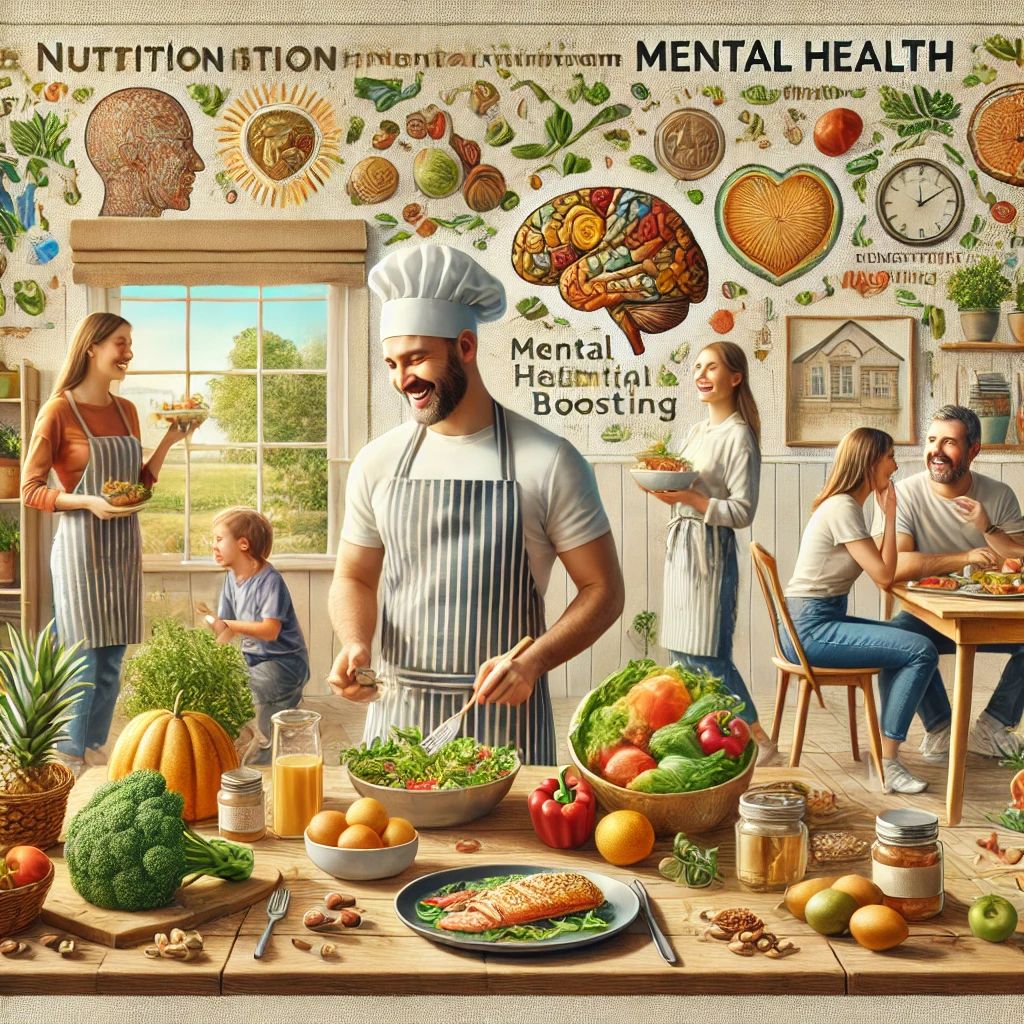
In recent years, the connection between nutrition and mental health has gained significant attention. While it is well-known that a balanced diet is crucial for physical health, its impact on mental well-being is equally profound. The food we consume plays a pivotal role in brain function, mood regulation, and overall mental health. By understanding how nutrition affects our minds, we can make informed choices that promote both physical and psychological well-being.
The Mind-Body Connection
The relationship between diet and mental health is complex and multifaceted. Our brains, like the rest of our bodies, require a range of nutrients to function optimally. Essential vitamins, minerals, and other nutrients support the production of neurotransmitters, the chemical messengers that regulate mood and cognition.
Brain Function: Nutrients like omega-3 fatty acids, antioxidants, and vitamins B, D, and E are crucial for brain health. They help maintain the structure of brain cells, protect against oxidative stress, and support cognitive functions such as memory and concentration.
Mood Regulation: Serotonin, often referred to as the "feel-good" neurotransmitter, is heavily influenced by diet. Approximately 90% of serotonin is produced in the gut, highlighting the strong connection between gut health and mood.
The Role of Nutrients in Mental Health
Different nutrients play specific roles in maintaining and enhancing mental health. Incorporating these key nutrients into your diet can have a significant positive impact on your mental well-being.
Omega-3 Fatty Acids: Found in fatty fish, flaxseeds, and walnuts, omega-3 fatty acids are essential for brain health. They reduce inflammation, support neurotransmitter function, and have been linked to a lower risk of depression and anxiety.
Antioxidants: Foods rich in antioxidants, such as berries, dark chocolate, and leafy greens, help protect the brain from oxidative stress. This protection is crucial for preventing cognitive decline and promoting overall brain health.
B Vitamins: B vitamins, particularly B6, B12, and folate, are vital for brain function. They play a role in producing neurotransmitters and reducing homocysteine levels, which are linked to an increased risk of depression.
Vitamin D: Known as the "sunshine vitamin," vitamin D is crucial for mood regulation. Low levels of vitamin D have been associated with an increased risk of depression and seasonal affective disorder (SAD).
Magnesium: This mineral, found in foods like nuts, seeds, and whole grains, is involved in hundreds of biochemical reactions in the body. It plays a role in regulating stress and mood, and magnesium deficiency has been linked to anxiety and depression.
Probiotics: A healthy gut microbiome is essential for mental health. Probiotic-rich foods like yogurt, kefir, and fermented vegetables can improve gut health and, in turn, influence mood and cognitive function.
The Impact of Dietary Patterns
While individual nutrients are important, overall dietary patterns have a significant impact on mental health. Adopting a balanced and varied diet can promote psychological well-being.
Mediterranean Diet: This diet, rich in fruits, vegetables, whole grains, fish, and healthy fats, has been associated with a reduced risk of depression and cognitive decline. Its emphasis on whole foods and healthy fats supports brain health and mood regulation.
Plant-Based Diet: Diets that are rich in plant-based foods provide essential nutrients and fiber that support gut health and overall well-being. They can reduce inflammation and improve mood.
Avoiding Processed Foods: Diets high in processed foods, sugars, and unhealthy fats have been linked to an increased risk of mental health issues. These foods can lead to inflammation, oxidative stress, and hormonal imbalances that negatively affect mood and cognitive function.
Practical Tips for a Mental Health-Boosting Diet
Incorporating a few simple dietary changes can have a profound impact on your mental health. Here are some practical tips to help you get started:
Eat a Variety of Foods: Ensure your diet includes a wide range of fruits, vegetables, whole grains, lean proteins, and healthy fats. This variety ensures you get a broad spectrum of nutrients essential for brain health.
Stay Hydrated: Dehydration can affect your mood and cognitive function. Aim to drink plenty of water throughout the day to stay hydrated.
Limit Sugar and Refined Carbs: High-sugar diets can lead to blood sugar spikes and crashes, which can negatively impact mood. Opt for complex carbohydrates that provide a steady source of energy.
Include Omega-3 Rich Foods: Incorporate sources of omega-3 fatty acids, such as salmon, flaxseeds, and walnuts, into your diet to support brain health and mood regulation.
Focus on Gut Health: Include probiotic-rich foods like yogurt and fermented vegetables in your diet to promote a healthy gut microbiome, which is closely linked to mental health.
Mindful Eating: Pay attention to your eating habits and how different foods make you feel. Mindful eating can help you make better food choices and improve your relationship with food.
The Holistic Approach
Nutrition is a crucial component of mental health, but it is part of a broader holistic approach. Combining a healthy diet with other lifestyle practices can further enhance your mental well-being.
Regular Exercise: Physical activity boosts endorphins, reduces stress, and improves mood. Aim for at least 30 minutes of moderate exercise most days of the week.
Adequate Sleep: Quality sleep is essential for mental health. Establish a regular sleep routine and create a restful environment to promote better sleep.
Stress Management: Incorporate stress-reducing practices like mindfulness, meditation, and deep breathing into your daily routine.
Social Connections: Building strong social connections and maintaining a support network can improve your mental health and provide emotional support.
Conclusion
The impact of nutrition on mental health is profound and far-reaching. By making informed dietary choices and adopting a balanced, nutrient-rich diet, you can support your brain health, regulate your mood, and enhance your overall mental well-being. Remember, the journey to better mental health is a holistic one, combining a healthy diet with other positive lifestyle practices. Embrace these changes and discover the transformative power of nutrition on your mental health.


